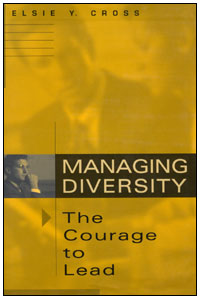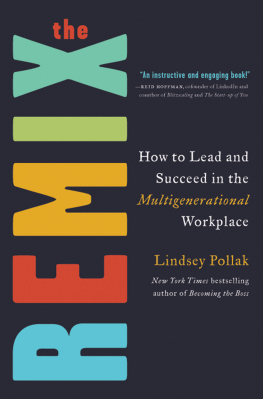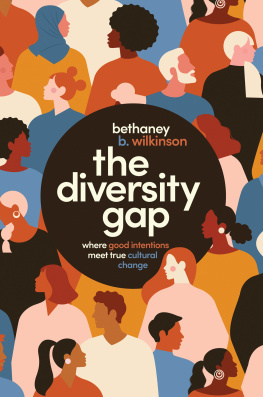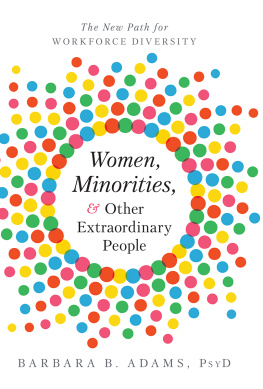Cover

| title | : | Managing Diversity--the Courage to Lead |
| author | : | Cross, Elsie Y. |
| publisher | : | Greenwood Publishing Group |
| isbn10 | asin | : | 1567202691 |
| print isbn13 | : | 9781567202694 |
| ebook isbn13 | : | 9780313001185 |
| language | : | English |
| subject | Diversity in the workplace. |
| publication date | : | 2000 |
| lcc | : | HF5549.5.M5C757 2000eb |
| ddc | : | 658.3/008 |
| subject | : | Diversity in the workplace. |
Page i
This page intentionally left blank.
Page ii
This page intentionally left blank.
Page iii
MANAGING DIVERSITY
The Courage to Lead
ELSIE Y. CROSS

Page iv
Library of Congress Cataloging-in-Publication Data
Cross, Elsie Y.
Managing diversitythe courage to lead / Elsie Y. Cross.
p. cm.
Includes bibliographical references and index.
ISBN 1-56720269-1 (alk. paper)
1. Diversity in the workplace. I. Title.
HF5549.5.M5 C757 2000
658.3'008 21dc21 99-040353
British Library Cataloguing in Publication Data is available.
Copyright 2000 by Elsie Y. Cross Associates, Inc.
All rights reserved. No portion of this book may be reproduced, by any process or technique, without the express written consent of the publisher.
Library of Congress Catalog Card Number: 99040353
ISBN: 1567202691
First published in 2000
Quorum Books, 88 Post Road West, Westport, CT 06881
An imprint of Greenwood Publishing Group, Inc.
www.quorumbooks.com
Printed in the United States of America

The paper used in this book complies with the Permanent Paper Standard issued by the National Information Standards Organization (Z39.481984).
10 9 8 7 6 5 4 3 2 1
Page v
Contents
Acknowledgments | vii |
Introduction | ix |
| Leadership for Democracy: The Managing Diversity Intervention | |
| Behind the Model | |
| Managing Diversity: The Beginning of a Theory | |
| From Theory to Practice | |
| The Theory Evolves | |
| Jaraco Corporation: A Case Study in Culture Change | |
| White Men as Champions | |
| Putting It All Together: The CoreStates Story | |
| What We Need to Know to Manage Diversity | |
| Citizens All: Toward the Future | |
APPENDIX 1 The Discourses of Diversity: The Links Between Conversation and Organizational Change
Nancie Zane | |
Page vi
APPENDIX 2 Measuring Results
Joseph Potts | |
APPENDIX 3 Suggestions for Further Reading | |
APPENDIX 4 The Language of Diversity: An Introductory Guide | |
Bibliography | |
Index | |
Page vii
Acknowledgments
A book that reflects on more than thirty years of work and life experience owes much to many people. While it is not possible to acknowledge the contributions of all those from whom I have learned and with whom I have shared this exciting journey, there are a number whose influence, both on me and on the field, has been exceptional. In this brief statement I can only begin to express my gratitude. Many of their names will appear again and again throughout the text.
In my early work in the school system in Philadelphia, Bob Blackburn was a major influence. Mark Cheslers work on racism and education was very important then, and continues to be so today. The founders and early members of the National Training Laboratories were mentors, colleagues and friends, and their work and thoughts have shaped my own. Among the many who should be named here, I will list just a few: Edie Seashore, an early and important mentor; Dick Beckhard, Ken Benne, Lee Bradford, Bob Chin, Bailey Jackson, Hal Kellner, Eileen Lang, Rod Napier, Micki Ritvo, Irv Robinson, Orion Worden. Oron South belongs to this group as well, and deserves special note because it was Oron who was the intellectual catalyst for our publication, The Diversity Factor, which remains an important vehicle for sharing our philosophy.
Others to whom I owe a debt of gratitude are people who were especially important as theorists about race, gender, social change and social justice. Alice Sargents work on androgyny changed the thinking of a whole generation. Kurt Lewins seminal work on communities, community organization and action research provided a solid basis. W.E.B.
Page viii
Du Bois, Kenneth Clark, Bayard Rustin, A. Philip Randolph, Angela Davis, James Baldwin, bell hooks and many, many others led the struggle for black equality, both by teaching people how to organize themselves and in providing a powerful literature of liberation. The wealth of writers who conveyed the concepts of feminism provided an intellectual and activist structure within which women could work together for equality. Paulo Freire, Frantz Fanon, Jean-Paul Sartre and Albert Camus helped me think in an international context. Maggie Kuhns skillful leadership of the Gray Panthers demonstrated the power both of women and of the elderly. Saul Alinskys radical thinking on how people with no money could nonetheless become powerfulby joining together with many other powerless but courageous people to challenge the entrenched privilege of the ruling elitewas provocative and practical. Gertrude Ezorskys work on racism and social justice has no equal.
As I began to work more intensely in the corporate world, I was privileged to have as colleagues some exceptional leaders: Gary Parlan, Bob Croce, James Rose, Steven Reynolds, Ben Markham and Terry Larsen, to name only a few.
I owe a debt beyond expression to those colleagues with whom I have worked most closely: Delyte Frost, Jack Gant, John Leeke, Kate Kirkham, Carol Brantley, Bo Razak, Patricia Wilson, Joseph Potts and many, many more who have worked with us over the years. Much of what I describe in this book is the result of our collaborative thinking. Our efforts and energies have flowed into the same stream; it is no longer always possible to differentiate the contributions of individuals from the collective wisdom of the whole. To all who have participated in this process, I offer this text as a tribute.
Most important of all have been the contributions and support of my family, my parents, my brothers and sisters, and my son, Barry Cross. Like all families, we have shared much of both sorrow and joy, and their steadfast love has given my life and work a firm foundation. My debt for the constant love and support of my best friend, Sam Romans, can never be repaid.
Next page










